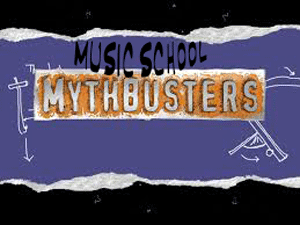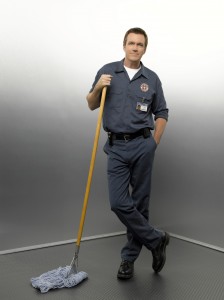Music School Mythbusters: How Important IS Your Teacher Assignment?
The Myth
Deciding which music schools to apply to is certainly a daunting task. From almost the moment the applications go live, it seems as though you’re besieged with a plethora of varying advice from your teacher, friends, colleagues, and parents: Pick a school that will nurture all of your interests. A conservatory would be the best fit for you. No, a university would be the best fit for you. You would love to live in a big city. No, a small college-town atmosphere is your cup of tea. But regardless of whether your mentor is encouraging you to try for Curtis or IU, chances are they’re going to conclude with the following refrain: your prospective teacher is the most important thing to consider. That’s right–you could get lucky and wind up at Juilliard, but if you’re going to be studying with What-Is-He-Doing-Here Teacher X, you might as well have headed off to the University of Southern North Dakota at Hoople to study with John Violasmith (a star of last week’s edition). With an abundance of excellent teachers spread out across the music school landscape, it’s now becoming much more common for students to attend a school of lesser renown solely because Hotshot Teacher A teaches there on a lucrative endowed professorship. But is such a situation actually ideal? Should students really turn down an admissions offer from a prestigious conservatory just because of an unfavorable teacher assignment? In this third edition of Music School Mythbusters, we’re going to find out.
The Argument for the Myth
To a layperson, this “myth” has false written all over it. Why would someone turn down a great school merely because they had an issue with one of its professors? It would be the academic equivalent of saying, “Oh, yes, I was accepted at Harvard, but the head of the economics department really creeped me out, so I went to the University of Texas-Brownville instead.” Of course, few academic programs place a similarly significant emphasis on the individual teacher-student relationship, and practically none can compare to the potential impact on a student’s career that is affected by a private instructor. It’s no secret that the teaching styles of the field’s top players differ greatly, making it possible for a student to have an unproductive experience with a typically popular teacher simply because the emphases of the instruction were not those that the student needed. I once knew an undergrad student who came in freshman year all excited to study with a top-name teacher at a prestigious east coast conservatory, but ended up switching studios midway through their degree because the teacher in question usually taught students who had already developed a solid technique, and this particular student still had a lot of things to work out. Similarly, I’ve known many of my colleagues to complete their undergrad at a relatively lesser-known music school and fit right in when arriving at the conservatory for their Masters because of the excellent instruction and guidance they received from their undergrad teacher. In previous generations, it was probably more of an imperative to attend a top-tier school because there weren’t as many amazing teachers out there, but these days, it’s so competitive to secure a teaching job at a college that you really have to know your stuff to get hired; most schools expect at a D.M.A. of their applicants, in addition to an extensive resume and extremely high quality playing. So, in this modern-day context, it’s becoming more and more likely that you can receive a great education at school that’s not rubbing elbows with Juilliard (or, more realistically, butting heads).
Furthermore, there’s no escaping the fact that the proficiency you exhibit on your instrument is the ultimate deciding factor when you’re under consideration by a potential employer, and when you’re behind the screen at a professional orchestra audition, no one will know (or care) whether your developed that proficiency in New York or in Wyoming. What will matter is that you sought out a teacher who “clicked” with you and enabled you to reach your potential. Just because you are physically present at a school on a daily basis does not mean that you will automatically develop an enhanced musical ability. If that were the case, the Juilliard custodians would be winning auditions.
The Argument Against the Myth
On the other hand, the environment that surrounds you on a daily basis for four years is similarly, if not equally, important to your career prospects. If your goal is to win a top-tier orchestral job, you don’t want to attend a school with a lacking ensembles department, and if you’re thinking of getting administrative experience in addition to performance training, you wouldn’t want to go to an exclusive conservatory. Besides, your teacher assignment isn’t set in stone; if it really turns out to be unbearable, switching studios is usually a possibility. Sure, degrees don’t matter when you’re behind the screen sweating it out with Don Juan, but there are many jobs in which your educational credentials play an important role during the interview process. The “it’s not what you know, it’s who you know” axiom is cliched and often irrelevant–if you manage to finagle your way into a job through a lucky connection, people will find out soon enough if you’re not qualified–but attending a high-level and diverse music school will definitely help you develop a network of useful contacts within the field.
Additionally, your colleagues at a given school can often be an important source of motivation. If you’re the best of the best at Podunk U, you might not experience the same incentive to work hard as if you were at the bottom of the pack at Prestigious Conservatory A. Your colleagues should not only represent friendly competition, however; you can learn a great deal from them as well. In the half-decade I’ve had the good fortune to spend at a couple high-level conservatories, much of the knowledge I’ve gained has come from my fellow students, whether it be through comments given in studio class or observations expressed in a chamber music rehearsal. Those types of learning experiences cannot be obtained in a smaller program–regardless of its faculty’s stature.
The Conclusion
While the environment and unique academic offerings at a given institution are certainly of great importance, the ultimate deciding factor in choosing a music school should be one’s assigned teacher. The classes and experiences you have in college are instrumental in developing your musicianship, but your instrumental musicianship is only developed between the hallowed walls of your teacher’s studio. Ideally, you should strive to be accepted by a great teacher at a great school, but the option of studying with one of the many excellent pedagogues who teach at a lesser-known, but nonetheless decent, music school is certainly preferable to going nowhere with What-Is-He-Doing-Here Teacher X at a more selective institution. The underlying intent of any aspiring music student should be to improve and learn as much as they can on their instrument, because college really is too short–you’ve got four, maybe six, years to study the repertoire at the highest level without the pressure of maintaining a job, supporting a family, or dealing with all the other obligations of professional life, and then you’ve got forty or so years (if you’re lucky) to implement that knowledge. You don’t want to waste the precious time you have in music school with a teacher who’s not right for you, and thus the assignment you are offered should really be the most important criteria as you make your choice.
So, for the first time in this series, our supposed “myth” has turned out to be true. It is my impression that most of the ones we hear are, in fact, false–but hey, all legends have a basis in fact, right? We’ve still got two more editions to go, and I’m still accepting suggestions, so please don’t hesitate to email (info@polyphonic.org), Facebook (Facebook.com/Polyphonic.org) or Tweet (@polpyhonic.org) your “myths” today!
More in this Series:
Is Playing Politics Necessary?
How Much Online Promotion is Too Much?
Shameless Self-Promotion Moment: If you’re interested in learning more about the process of applying to–and deciding on–a music school, consider registering for Polyphonic’s next Webinar, “Applying to Grad School of Music: An Inside Look,” which will take place from 6-7 P.M. next Monday evening, October 21st. I’m excited to be serving as a panelist along with Dr. Matthew Ardizzone, Associate Dean of Admissions at the Eastman School of Music, and Jennifer Snodgrass, Associate Professor of Music and Director of Graduate Studies at Appalachian State University’s Hayes School of Music. For more information, including the link to registration, visit this page.




